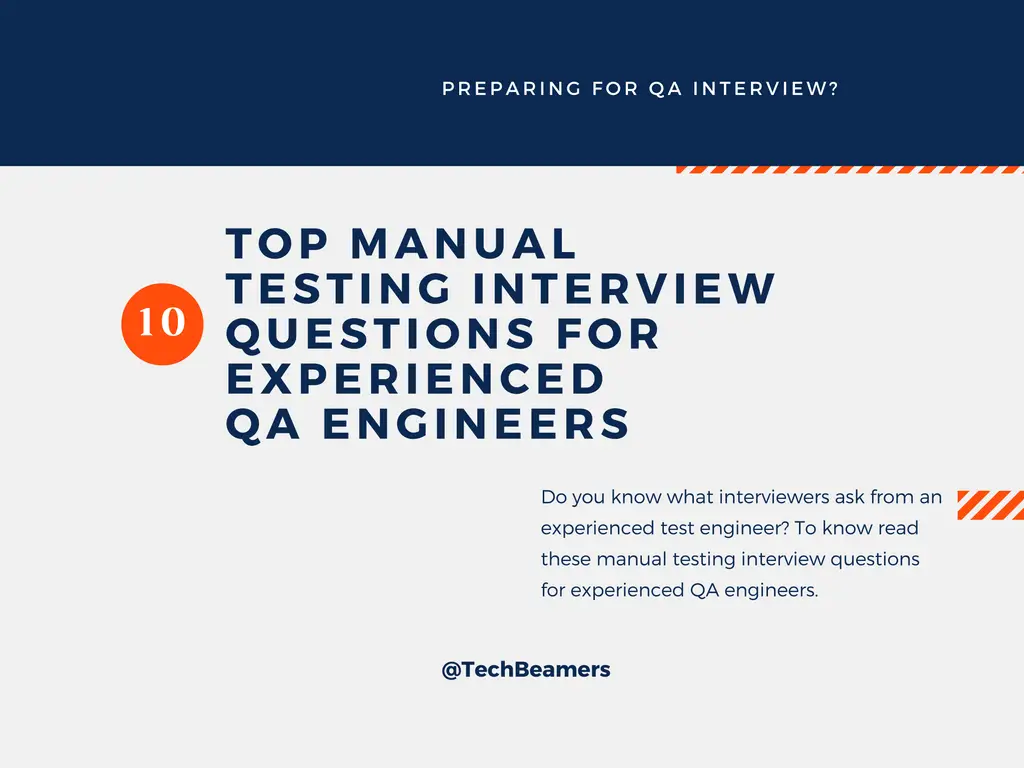If you are reading this page, you most likely searching for the best testing interview questions to crack your next job interview. And we can guarantee you will get the right advice to succeed from here.
So, get ready for your upcoming testing interview with confidence! Whether you’re a beginner, intermediate, or advanced tester, we can certainly help. Our extensive collection of 300+ questions and answers ensures you’re ready for any challenge.
Crack your next testing interview!
We have designed testing interview questions to assess the candidate’s knowledge of the following:
- Different types of software testing
- Software testing life cycle (SDLC)
- Test case design and execution
- Common testing tools and frameworks
- Verification and validation
- Importance of testing in the software development lifecycle
- Automation testing using Selenium, Java, and Python
- Performance testing
Moreover, our questions even help in assessing the candidate’s problem-solving skills and ability to think critically. For example, the interviewer may ask the candidate to design a test case for a specific feature. And, also to explain how would you test a complex system.
By asking these questions, the interviewer can get a better understanding of the candidate’s skills and experience. He then can make a more informed decision about whether or not to hire him.
How an interviewer would benefit from these questions?
Here are some of the ways that testing interview questions can help:
- Identify qualified candidates: The questions can help to identify candidates who have the skills and experience necessary for the role. This can save the company time and money by reducing the number of candidates in the interview pipeline.
- Assess the candidate’s knowledge and skills: They can help in assessing the candidate’s knowledge of software testing principles and practices. This can help to ensure that the candidate has the necessary skills to do the job effectively.
- Identify potential problems: The interview questions help identify potential problems with the candidate. For example, if he is unable to answer basic questions, it may be a sign that he lacks the necessary skills.
- Make an informed decision: By asking testing interview questions, the interviewer can get a better understanding of the candidate’s ability. After that, he shall make a more informed decision about whether or not to hire them.
Overall, testing interview questions are an important part of the hiring process for software testing roles. They can help to identify qualified candidates, assess their knowledge and skills, identify potential problems, and make an informed decision about whether or not to hire them.tuneshareGoogle it
Why any candidate should go through these questions?
The candidate would learn following of the many things from here:
- Skills Assessment: Explore your testing expertise and showcase your knowledge.
- Comprehensive Preparation: A valuable resource to refine your skills and fill knowledge gaps.
- Confidence Boost: Gain the confidence you need to excel in your testing interview.
- Alignment with Expectations: Tailor your answers to match the specific job requirements.
- Showcase Your Skills: Highlight your practical experiences and demonstrate your testing capabilities.
- Enhance Problem-Solving: Sharpen your critical thinking skills with real-world testing scenarios.
- Gain a Competitive Edge: Stand out as a well-prepared and knowledgeable candidate in the competitive job market.
300+ testing Q&A
Here is our directory of more than 300 testing interview questions. Let’s divide them into two main categories:
Functional testing
Functional testing interview questions are questions that are asked to assess a candidate’s knowledge and skills in functional testing.
In this type of software testing, we focus on the functionality of the software to ensure that it works as expected. This means testing all of the different features of the software and making sure that they work according to the requirements.
In addition to the above references, here are some short and crisp tips for functional testing interview preparation:
- Understand the different types of functional testing.
- Be able to explain the test case design process.
- Be familiar with common functional testing tools and techniques.
- Be able to discuss your experience with functional testing.
- Be prepared to answer questions about your problem-solving skills.
- Be confident and enthusiastic about functional testing.
Non-functional testing
Non-functional testing interview questions are questions that are asked to assess a candidate’s knowledge and skills in non-functional testing. Non-functional testing is a type of software testing that focuses on the following areas:
- Performance, security, usability, and other non-functional aspects of the software.
In addition to the above questions, here are some tips for answering non-functional testing interview questions:
- Prepare yourself to explain the understanding of non-functional testing concepts and principles.
- Recollect examples of your experience with non-functional testing. Also, be mindful of the different types of software or testing tools you have used.
- Ensure you can articulate your test case design process, as well as, your approach to test specific non-functional aspects of a software application.
- Be able to discuss the importance of non-functional testing in the software development lifecycle.
By following these tips, you can increase your chances of success in your next non-functional testing interview.
Happy Learning!

